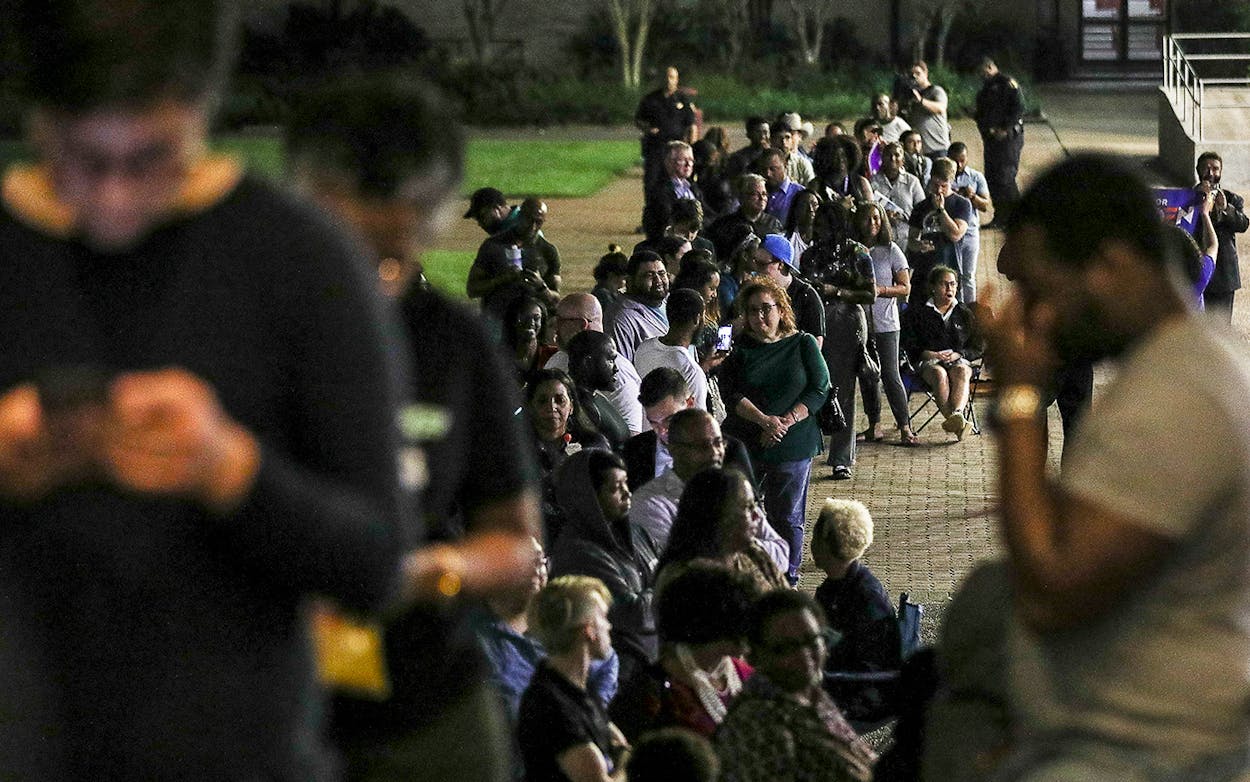We have a general election coming up in Texas in about six months. Much is at stake, as the country is not in great shape. It’s vital that this election be transparent and fair, and that everyone who is legally entitled to vote in November can do so and do so safely.
That’s why Harris County clerk Diane Trautman’s resignation earlier this week is a warning. It was the job of Trautman, 70, to run elections in America’s third-most-populous county. She resigned just sixteen months into her term “because of the COVID-19 pandemic, my age, and underlying health issues,” she said in a statement, adding that “I do not feel I can safely continue to carry out my duties.” Trautman, with her ample staff, judged that she could not even run the election safely.
Yet we’re on course to have a lot of other 70-year-olds in Texas rubbing touch-screen voting machines at crowded polling locations during the fall, when many public health experts anticipate another wave of COVID-19 infections will come. (Voters older than 65 are entitled to mail-in ballots, but many will doubtless vote in person anyway, not to mention those under 65 whose health conditions—obesity, hypertension, lung ailments—put them at great risk.) The time to do something about this is right now. Planning and implementing a new voting system will take time.
A bungled election would pose both a threat to the integrity of our political system and a grave public health risk. Public health officials believe that in April, following some Democrats’ insistence that primaries proceed, polling centers in Illinois and other states might have been vectors for the disease. Some poll workers subsequently tested positive for COVID-19. At least one died. During the 1918 influenza epidemic, quarantines were lifted to allow candidates and the public to gather for campaign events for five days in the run-up to the general election. Infections, and deaths, spiked as a result.
One way to ensure that everyone can vote safely is to extend voting by mail to all who want it. Millions of Americans already vote by mail—among them soldiers, the disabled, the elderly. Republicans, including the president, oppose expansion of this practice. The rationale they typically state in public is that they worry that expansion will precipitate voter fraud. Now, let’s set aside that there’s no evidence of increased voting fraud in states that have expanded voting by mail. Let’s also set aside that Trump—who for all his shortcomings is often bracingly transparent about his real reasons—recently observed that expansion of voting by mail “doesn’t work out well for Republicans.” Let’s keep setting stuff aside and note that the president himself votes by mail, and that the only significant recent case of vote fraud involving absentee ballots was perpetrated on behalf of a Republican congressional candidate in North Carolina. And let’s assume for a moment that voter fraud is a real threat.
Even then, there’s good news for Texas Republicans: though Democrats influence elections in some big counties, GOP officials run the state government in Texas toe to tip. They have the power to install whatever safeguards they want against voter fraud.
But instead of working to figure this out, the state GOP is directing all its energy toward preventing expansion of voting by mail. Texas attorney general Ken Paxton is going to the state Supreme Court to try to overturn a lower court’s ruling that the voting-by-mail qualifications, as currently written, permit all voters to request absentee ballots amid a public health crisis of this magnitude. (Texas’s election code permits absentee voting for those who have “a sickness or physical condition that prevents the voter from appearing at the polling place on election day without a likelihood of needing personal assistance or of injuring the voter’s health.”)
If Paxton succeeds, Texas will face a lot of urgent and difficult questions about how to hold a vote this November. The Legislature, now out of session, will not have input in addressing these questions. And if the confusion persists long enough, there might not be time to put together an alternative.
If Republicans don’t want counties encouraging residents to request absentee ballots, they need to put forward a realistic alternative plan that would allow for safe voting. But that doesn’t seem to be on the agenda. In April, Paxton joined Texas GOP chairman James Dickey on a town-hall call with Republicans to talk about, among other things, the upcoming election. The two were unified on one point, which they reiterated over and over: those instructing people to request absentee ballots without having a disability as Paxton defined it—and as he’s asking the Texas Supreme Court to define it—were committing a felony offense that Paxton would be keen to prosecute.
Elections shouldn’t just be fair. They should be unimpeachably fair. It’s unfortunate that the state’s attorney general is willing to get on a call with the head of a political party and reassure its members that they’re on the same page about how the upcoming election ought to work. But we know where Paxton stands, so if he prevails with the state Supreme Court, somebody else—perhaps local election officials—needs to step up with an alternative plan for safe voting, and quickly. If we force mass in-person voting while COVID-19 is still a threat, Texans will die in far greater numbers than they would otherwise. If we bungle the election, we’ll undermine faith in our political system in a way that will last for years to come.
- More About:
- Politics & Policy
- Ken Paxton
- Donald Trump








